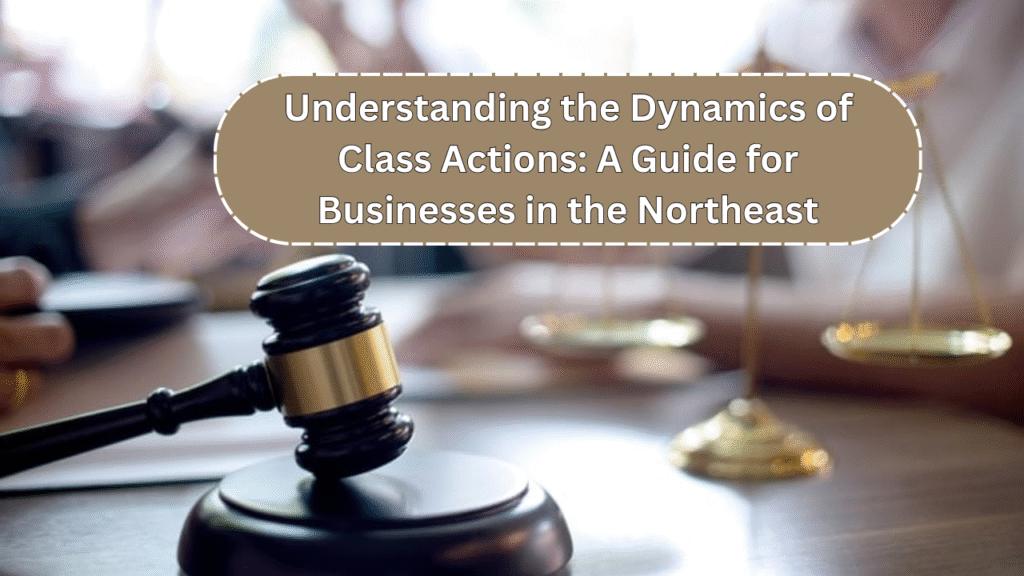The increasingly litigious environment of the Northeastern United States, class action lawsuits represent a significant and growing concern for businesses of all sizes. From consumer protection claims to data privacy breaches, companies operating in states like New York, Massachusetts, and Pennsylvania must navigate a complex legal landscape to avoid costly and reputation-damaging litigation.
This guide explores what class actions are, common triggers in the region, the legal framework surrounding them, and the proactive steps businesses can take to mitigate risk.
What Is a Class Action?
A class action is a type of lawsuit in which one or more plaintiffs sue on behalf of a larger group who have suffered similar harm. This mechanism allows courts to handle numerous similar claims efficiently, especially when individual lawsuits would be impractical due to cost or scale.
The Federal Rules of Civil Procedure govern these cases, specifically Rule 23, which outlines the necessary criteria for class certification numerosity, commonality, typicality, and adequacy of representation. Each element must be met before a lawsuit can proceed as a class action.
States across the Northeast also have their own legal standards, which can be more stringent than federal rules. As a result, businesses must understand not just the national framework but also the unique state-specific requirements that could impact litigation.
Common Triggers in the Northeast
Several recurring issues make Northeastern businesses particularly vulnerable to class actions:
- Consumer Protection Violations: Businesses can face lawsuits for misleading advertising, false claims, or deceptive labeling practices. For example, allegations that products were falsely marketed as “natural” or “eco-friendly” have led to numerous class actions across New York and Massachusetts.
- Employment Disputes: Wage and hour violations, unpaid overtime, or discriminatory practices often result in class litigation. States like New York have robust labor laws under the New York Department of Labor that amplify exposure to such claims.
- Data Privacy and Security: With data breaches on the rise, class actions over mishandling of personal information are becoming more frequent. Regulatory bodies such as the Massachusetts Office of Consumer Affairs and Business Regulation enforce strict privacy standards, and violations can lead to class action lawsuits alongside government penalties.
- Environmental, Social, and Governance (ESG) Misrepresentation: Companies accused of “greenwashing” exaggerating their environmental responsibility are increasingly targeted. In one recent example, a Northeastern retailer faced litigation after marketing itself as carbon-neutral without substantiating those claims.

Legal Environment in the Region
The Northeast’s dense regulatory framework makes it a fertile ground for class actions. In states like New York, even procedural complexity can become a burden. According to the New York State Unified Court System, the state maintains specific procedural rules for class certification and settlement that often extend the duration and cost of litigation.
These challenges are amplified by an active plaintiffs’ bar and consumer-friendly statutes, which increase the incentive for legal action—even over seemingly minor infractions.
Risk Mitigation Strategies
Businesses can reduce the likelihood of facing a class action by adopting several proactive strategies:
- Routine Compliance Audits: Regularly assess internal policies to ensure alignment with federal and state regulations, particularly those related to consumer protection and employment law.
- Transparent Marketing: Avoid making exaggerated or unverified claims in advertisements and product labels. Any ESG-related promises should be supported by evidence.
- Data Protection Measures: Invest in cybersecurity infrastructure and train staff to handle customer data according to regulations like the New York SHIELD Act, which governs data security for businesses.
- Workplace Best Practices: Educate managers and HR staff on proper wage practices, discrimination prevention, and employee classification to avoid labor law violations.
What to Do If You’re Sued
Facing a class action can be overwhelming, but early and informed action can minimize damage:
- Hire Experienced Counsel: Work with attorneys specializing in class action defense who understand both federal and local nuances.
- Evaluate the Case: Review the claims thoroughly to understand their validity and potential implications. Your legal team may recommend challenging class certification, which can prevent the case from proceeding as a class action.
- Consider Settlement: While some cases warrant a full defense, others may be more efficiently resolved through a settlement. According to guidance from the U.S. District Court for the Northern District of California, any settlement must be fair, reasonable, and subject to court approval.
- Communicate Transparently: Keep internal and external stakeholders informed, especially if the case becomes public. Transparency can mitigate reputational harm and preserve customer trust.
Final Thoughts
For Northeastern businesses, understanding class actions isn’t just a legal concern it’s a critical aspect of strategic risk management. By staying informed, investing in compliance, and responding decisively when litigation arises, companies can protect their interests and maintain public trust in an increasingly complex regulatory climate.








